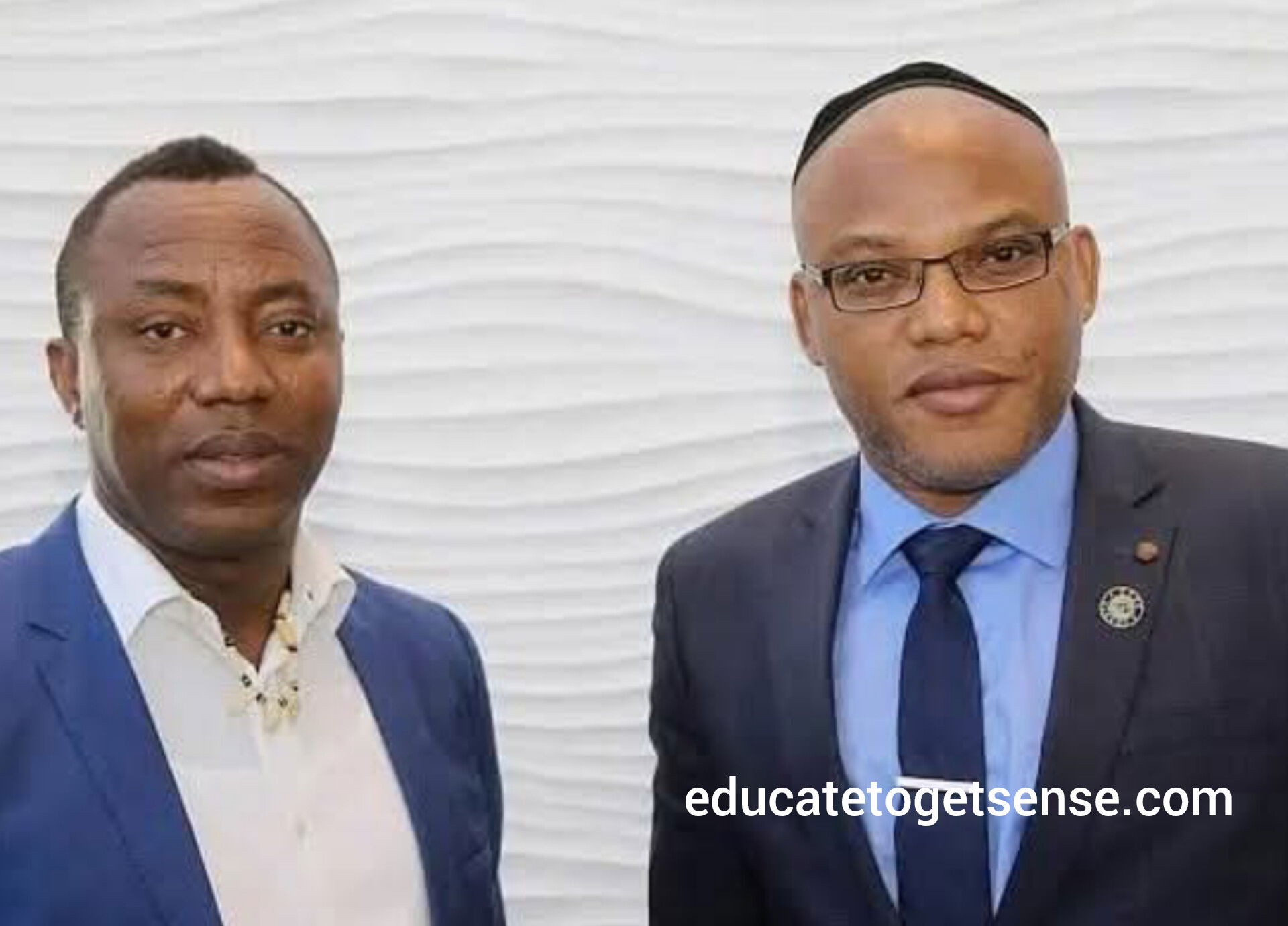THE CONTINUED INCARCERATION OF NNAMDI KANU: A POLITICAL QUAGMIRE IN THE SOUTH-EAST

The detention of Nnamdi Kanu, leader of the Indigenous People of Biafra (IPOB), remains a deeply contentious and politically charged issue in Nigeria. For many, his prolonged incarceration symbolizes a broader struggle for self-determination and justice, particularly within the South-East region.
However, recent revelations by prominent activist Omoyele Sowore have cast a new, intricate light on the situation, suggesting that Kanu’s continued imprisonment is not merely a matter of legal process or state security but is, in fact, being actively influenced by the political calculations of certain South-East politicians.
Sowore's assertion that "Nnamdi Kanu is still in prison because some politicians in the South-East decided that releasing Nnamdi Kanu would jeopardize their political future" introduces a layer of complexity that demands thorough examination.This claim, if accurate, paints a grim picture of self-serving political maneuvering at the expense of a region's collective yearning for resolution and peace. To understand the implications, it is crucial to delve into the potential motivations behind such alleged actions. South-East politicians operate within a delicate balance of regional aspirations, national political dynamics, and their individual ambitions.
The release of Nnamdi Kanu would undoubtedly send seismic waves through this political landscape, potentially elevating him to an even more influential position, capable of swaying public opinion and electoral outcomes.Consider the various factions and individuals within South-East politics. There are those who have historically aligned themselves with the ruling national parties, often seen as brokers between Abuja and the South-East.
Their political survival frequently depends on maintaining a certain status quo and not antagonizing the federal government. A Kanu released and potentially reinvigorated might be perceived as a threat to their established influence, drawing popular support away from them and towards a more radical, independent voice. His charisma and the deep-seated grievances he articulates resonate strongly with a significant portion of the populace, potentially overshadowing the achievements or promises of conventional politicians.
Furthermore, the narrative of IPOB and the agitation for Biafra has often been a double-edged sword for South-East politicians. While they may publicly express sympathy for the underlying issues of marginalization, few are willing to openly endorse the secessionist agenda for fear of federal reprisal or alienating a more moderate electorate. Kanu's release would force these politicians to take a more definitive stance, potentially exposing their fence-sitting or perceived lukewarm commitment to regional interests. Some might fear that a free Kanu would directly challenge their leadership, portraying them as ineffective or compromised in their pursuit of justice for the South-East.
The concept of "jeopardizing their political future" can manifest in several ways. Firstly, a popular Nnamdi Kanu could become a kingmaker, or even a formidable political force himself, directly competing for the loyalty and votes of the people. This would diminish the power base of existing politicians, making their re-election bids or aspirations for higher office significantly harder. Secondly, if Kanu's release were to lead to renewed or intensified agitation, these politicians might be blamed by the federal government for failing to control the region, potentially leading to a withdrawal of federal patronage or even punitive measures against them. Conversely, if they are seen as complicit in keeping him detained, they might face the wrath of their constituents who view Kanu as a symbol of their collective struggle. This creates a difficult tightrope walk for them.Sowore's revelation also touches upon the broader issue of political opportunism and the weaponization of sensitive issues for personal gain.
If politicians are indeed sacrificing the potential for peace and resolution in the South-East for their own electoral advantages, it speaks to a profound crisis of leadership and representation. It suggests a system where the welfare of the people is secondary to individual political survival. Such an environment breeds mistrust between the governed and their representatives, further fueling cynicism about the democratic process.Moreover, the legal dimension of Kanu's detention cannot be entirely divorced from these political considerations.
While the courts are meant to be independent, the reality of political influence in legal processes in Nigeria is often undeniable. If powerful political figures in the South-East are lobbying behind the scenes for Kanu's continued detention, it could subtly or overtly influence the pace and outcomes of his legal proceedings. This raises serious questions about judicial independence and the fair administration of justice.The call for Kanu's release has been multifaceted, coming from various groups including human rights organizations, traditional rulers, religious leaders, and a significant segment of the South-East populace.
The federal government has consistently cited national security concerns as the primary reason for his detention and ongoing trial. However, Sowore's statement introduces a powerful counter-narrative – that the obstacles to his release are not solely from Abuja but are also actively being erected from within the South-East itself.This situation demands a deeper introspection by South-East political leaders. If the allegations hold true, it necessitates a critical examination of their priorities and their commitment to the genuine interests of their constituents.
The question then becomes: what kind of political future are they truly protecting? Is it one built on the genuine consent and support of the people, or one sustained by manipulating a sensitive issue for personal gain?Ultimately, Sowore's intervention serves as a powerful reminder that the Nnamdi Kanu saga is not a monolithic issue. It is a complex tapestry woven with threads of national security, human rights, ethnic identity, and, crucially, intricate political machinations. The path to resolution, therefore, must involve addressing not just the overt legal and security concerns, but also the hidden hands of political opportunism that may be prolonging the agony of a region and its people.
Understanding these internal political dynamics is paramount to unraveling the deadlock surrounding Nnamdi Kanu's detention and charting a more constructive course for peace and stability in the South-East. The image below depicts a stylized representation of political maneuvering behind prison bars, symbolizing Sowore's revelation.